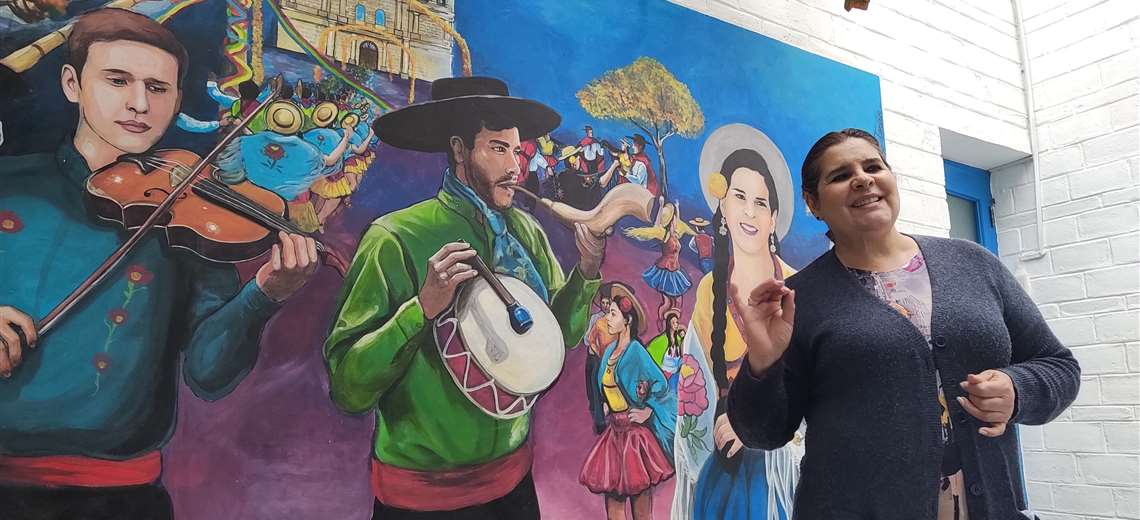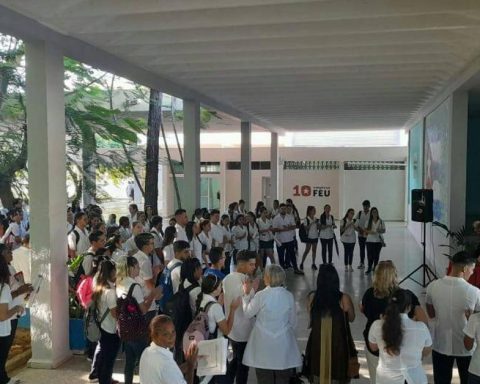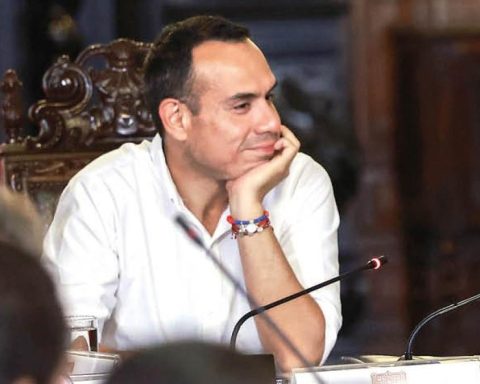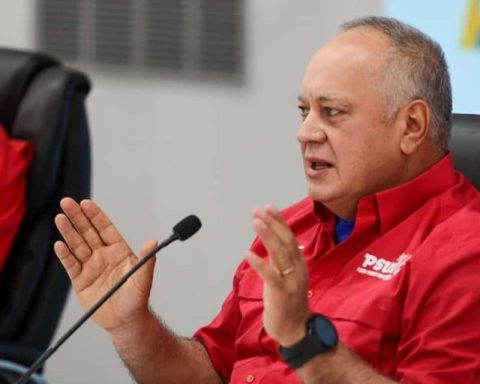In the heart of the city of Tarija, on Colón street and half a block from Sucre square, a door opens a world. Behind her, the visitor discovers in every corner images, objects and memories that weave together the life and career of one of the emblematic artists of Bolivian folklore and a voice that identifies the music of the south of the country. She, Enriqueta Ulloa, is part of what is considered the holy trinity of the most popular female voices in national music, along with Gladys Moreno and Zulma Yugar.
Retired from the stage a few years ago, the interpreter of Chapaco Soy transformed an old house belonging to her parents into a boutique hotel, which she has named La Casa de Enriqueta Ulloa and where has condensed 40 years of artistic life that is told everywhere. For example, the rooms for guests, which do not exceed ten, have, instead of numbers, the names of the songs that he made popular.
The central courtyard, which as is traditional in Tarija, has a grape vine that gives it shade, has a mural with characters and traditional festivities from the south and in which the singer is portrayed in the typical costume of the chapaca woman, as it was common to see her at her performances. But perhaps the most striking thing about the place is the main room of the house that has been converted into a small museum, where you can find the suits and blankets, records and recognitions that he received throughout his career the one that was considered ‘Queen of Bolivian song’ at the Lauro de la Canción festivals in the 80s.
However, the most remarkable thing about the visit to La Casa de Enriqueta Ulloa is that it is the artist herself who is in charge of guiding visitors through her small museum, detailing at each step the importance that these objects have had; from the photographs of her life, from when she was a child, her encounter with other personalities from the cultural and political life of the country and even those of her participation in the film Amargo Mar, by Antonio Eguino, in which she was the protagonist.
‘Queta’, as her relatives call her, clarifies the route with anecdotes of characters and moments of her life and makes the walk warmer interpreting some songs a cappella, which cause many emotions among the occasional attendees.
“With this exchange that I have with people I have found myself with very strong emotions, because there are people, especially when they hear me sing, that some start to cry and obviously it breaks me and that feeds my spirit, because I understand that at some point in their lives I have been able to enter into what I consider the most important thing, which are feelings. My songs sometimes refer to a special moment or remind them of a loved one.either”, says the singer-songwriter.
Shortly after her 70th birthday, (July 14) Enriqueta Ulloa is vital and active. For almost eight years he returned to Tarija, after spending more than 30 living in La Paz, where in addition to spreading his music, he founded the Bolivian Association of Artists, Interpreters and Performers of Music (Abayem), he was at the head of the Bolivian Society of Authors and Composers of Music (Sobodaycom) and ventured into politics with a position in the governorship and the Mayor’s Office of La Paz. He lives on the outskirts of the city, since the house is only for guests. Nevertheless, Every day he attends to all the details so that it works properly.
“It’s been almost 8 years since I’ve lived in Tarija again, the first four years I was traveling, because I hadn’t left the stage yet and it was more complicated since Tarija, but I’ve fulfilled the biggest goal, which was to be with my parents until their last days together with them”, he comments and adds that music continues to be vital in his life “Although I have left the stage, I’m still composing and I want to continue recording, maybe I’ll release songs four by fourIt’s because now releasing an album doesn’t make sense, firstly because it costs you a lot of money, secondly because it’s going to be pirated the next day”.
In La Casa de Enriqueta Ulloa, the artist has invested time, effort and her savings, she even sold her house in La Paz to finance the remodeling of this space, which more than commercial purposes, she says, aims to become a cultural space and tourist. Although it opened its doors on February 27, 2020, the covid-19 pandemic caused it to remain open intermittently until 2022, when it is already starting to operate regularly. However, and Despite being a great tourist attraction in the capital of Tarija, Enriqueta indicates that she has not had the support of the authorities even for the promotion of the place, which sometimes makes her hesitate to continue with the project.
“It would be very hard and sad, because I have put a lot of love into this project, but sometimes it is expensive to maintain a space like this. Many people do not know the house. Here the authorities of Tarija, I don’t know if they are careless or not interested, but neither from the areas of culture or tourism of the Governor’s Office or the Mayor’s Office have given importance to it and they are unaware of the house. Those who come here are mostly people from the interior of the country or foreigners brought by tour operators,” says the disappointed artist, who still he dreams that the wide patio of that old mansion will be played with guitars in which national and visiting artists share and celebrate life.

In the heart of the city of Tarija, on Colón street and half a block from Sucre square, a door opens a world. Behind her, the visitor discovers in every corner images, objects and memories that weave together the life and career of one of the emblematic artists of Bolivian folklore and a voice that identifies the music of the south of the country. She, Enriqueta Ulloa, is part of what is considered the holy trinity of the most popular female voices in national music, along with Gladys Moreno and Zulma Yugar.
Retired from the stage a few years ago, the interpreter of Chapaco Soy transformed an old house belonging to her parents into a boutique hotel, which she has named La Casa de Enriqueta Ulloa and where has condensed 40 years of artistic life that is told everywhere. For example, the rooms for guests, which do not exceed ten, have, instead of numbers, the names of the songs that he made popular.
The central courtyard, which as is traditional in Tarija, has a grape vine that gives it shade, has a mural with characters and traditional festivities from the south and in which the singer is portrayed in the typical costume of the chapaca woman, as it was common to see her at her performances. But perhaps the most striking thing about the place is the main room of the house that has been converted into a small museum, where you can find the suits and blankets, records and recognitions that he received throughout his career the one that was considered ‘Queen of Bolivian song’ at the Lauro de la Canción festivals in the 80s.
However, the most remarkable thing about the visit to La Casa de Enriqueta Ulloa is that it is the artist herself who is in charge of guiding visitors through her small museum, detailing at each step the importance that these objects have had; from the photographs of her life, from when she was a child, her encounter with other personalities from the cultural and political life of the country and even those of her participation in the film Amargo Mar, by Antonio Eguino, in which she was the protagonist.
‘Queta’, as her relatives call her, clarifies the route with anecdotes of characters and moments of her life and makes the walk warmer interpreting some songs a cappella, which cause many emotions among the occasional attendees.
“With this exchange that I have with people I have found myself with very strong emotions, because there are people, especially when they hear me sing, that some start to cry and obviously it breaks me and that feeds my spirit, because I understand that at some point in their lives I have been able to enter into what I consider the most important thing, which are feelings. My songs sometimes refer to a special moment or remind them of a loved one.either”, says the singer-songwriter.
Shortly after her 70th birthday, (July 14) Enriqueta Ulloa is vital and active. For almost eight years he returned to Tarija, after spending more than 30 living in La Paz, where in addition to spreading his music, he founded the Bolivian Association of Artists, Interpreters and Performers of Music (Abayem), he was at the head of the Bolivian Society of Authors and Composers of Music (Sobodaycom) and ventured into politics with a position in the governorship and the Mayor’s Office of La Paz. He lives on the outskirts of the city, since the house is only for guests. Nevertheless, Every day he attends to all the details so that it works properly.
“It’s been almost 8 years since I’ve lived in Tarija again, the first four years I was traveling, because I hadn’t left the stage yet and it was more complicated since Tarija, but I’ve fulfilled the biggest goal, which was to be with my parents until their last days together with them”, he comments and adds that music continues to be vital in his life “Although I have left the stage, I’m still composing and I want to continue recording, maybe I’ll release songs four by fourIt’s because now releasing an album doesn’t make sense, firstly because it costs you a lot of money, secondly because it’s going to be pirated the next day”.
In La Casa de Enriqueta Ulloa, the artist has invested time, effort and her savings, she even sold her house in La Paz to finance the remodeling of this space, which more than commercial purposes, she says, aims to become a cultural space and tourist. Although it opened its doors on February 27, 2020, the covid-19 pandemic caused it to remain open intermittently until 2022, when it is already starting to operate regularly. However, and Despite being a great tourist attraction in the capital of Tarija, Enriqueta indicates that she has not had the support of the authorities even for the promotion of the place, which sometimes makes her hesitate to continue with the project.
“It would be very hard and sad, because I have put a lot of love into this project, but sometimes it is expensive to maintain a space like this. Many people do not know the house. Here the authorities of Tarija, I don’t know if they are careless or not interested, but neither from the areas of culture or tourism of the Governor’s Office or the Mayor’s Office have given importance to it and they are unaware of the house. Those who come here are mostly people from the interior of the country or foreigners brought by tour operators,” says the disappointed artist, who still he dreams that the wide patio of that old mansion will be played with guitars in which national and visiting artists share and celebrate life.


;



















